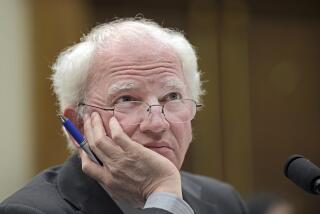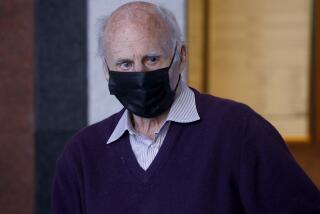Suspension Voted for Attorney Who Abandoned Clients
- Share via
SAN FRANCISCO — Over strong dissent, the state Supreme Court refused by a vote of 4 to 3 Thursday to disbar a Newport Beach lawyer who in part blamed agoraphobia, the fear of going out in public, for a disappearance that left several clients without an attorney.
The court majority, rejecting a recommendation by the California State Bar, said that although the attorney’s condition did not excuse his actions, disbarment would be “too harsh” under the circumstances.
Instead, the justices suspended John Earl Frazer from practicing law for at least 18 months on charges that he abandoned 11 clients in the midst of their cases and failed to repay loans he obtained from others.
The court ordered Frazer to pay $52,860 in restitution and said his suspension would be extended if he fails to pay.
Frazer, reached at his Newport Beach home, said he was “delighted and pleased” at the court’s ruling.
He did not dispute the merits of the argument against him nor offer any excuse for his actions when he represented himself before the Supreme Court, he said. “An act is not excused,” he said, “but there is mitigation.”
Frazer, 40, has been a lawyer since 1974. He discovered his agoraphobia and depression in 1982 when he moved from Big Bear to Newport Beach, he said, and has been under psychiatric care since. He called his current treatment “periodic monitoring.”
His difficulties arose while he was practicing law in San Bernardino County. He said has worked without ill effects since he moved to Newport Beach and began undergoing treatment.
By allowing him to resume his law practice, the court ensured that his creditors will be paid, he said. He said “there is no retracting” of his sworn statement to repay his former clients.
“All of us would love to be paid,” said Marcy McCann, a dental hygienist of San Diego. I hope he has the ability to pay.”
In 1981, McCann lent Frazer $13,000 for a real estate deal. The loan took the form of a second trust deed on his Big Bear home, which McCann said was valued at about $110,000. Later, she found the property already was subject to first and second trust deeds totaling about $114,000. “The collateral did not exist,” she said.
“What can I say? He was an attorney, and I trusted him,” McCann, 38, said.
She said she never saw any evidence of Frazer’s agoraphobia.
Three justices dissented from Thursday’s decision, noting that Frazer was able to carry out several profitable financial transactions for himself during the time he says he suffered agoraphobia and severe depression.
Justice David N. Eagleson, joined by Chief Justice Malcolm M. Lucas and Justice John A. Arguelles, said the lawyer “has demonstrated an unmitigated, selfish disregard for others which simply should not be tolerated in the legal profession.”
Eagleson wrote that Frazer had “literally abandoned” 11 clients in 1980-81, disappearing from his office and leaving them no way to contact him.
In the time he allegedly suffered from the malady, Frazer was able to obtain $37,000 in loans from other clients, negotiate a $450,000 loan from an investment firm and twice take trips to San Diego in the course of the transactions, Eagleson noted.
“Since (Frazer’s) mental condition did not affect his ability to protect his own interests, his failure to protect the interests of his clients is inexcusable,” Eagleson wrote.
The State Bar Court had recommended to the justices that Frazer be disbarred for misconduct resulting from financial difficulties, depression, the unannounced closing of his office in San Bernardino County and his disappearance from the area in 1981.
The court majority chose the lesser punishment in an unsigned opinion issued by Justices Stanley Mosk, Allen E. Broussard, Edward A. Panelli and Marcus M. Kaufman.
Incapacitating Condition
The court noted that a person suffering from agoraphobia can become so incapacitated by anxiety that he cannot leave his home or even talk on the telephone.
The justices said the Bar Court had given too little consideration to the effect of the disease and to such other mitigating factors as depression and financial difficulty, which resulted in Frazer’s bankruptcy, eviction from his office and loss of his home.
The justices noted also that Frazer’s record otherwise is unblemished and that he had expressed remorse and his intention to pay everyone he owes.
More to Read
Sign up for Essential California
The most important California stories and recommendations in your inbox every morning.
You may occasionally receive promotional content from the Los Angeles Times.










